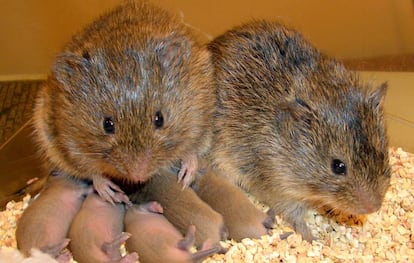How to get over a breakup, according to the most monogamous animal
An experiment with prairie voles — small, fluffy rodents — explains how reuniting with an old partner generates a rush of dopamine that declines as time passes

At best, it offers clues on how to get over a breakup. At worst, it’s a small metaphor about love and oblivion. A study conducted with prairie voles — small, fluffy rodents — has shown that these creatures experience an explosion of dopamine (the pleasure hormone) when they’re reunited with their partner. However, after a period of separation, the effect diminishes. In short, over time, mice get over their ex. But they never forget them.
“We know that they remember their partner, even after not seeing them for four weeks,” explains Zoe Donaldson, a behavioral neuroscientist at the University of Colorado Boulder and lead author of the study. The newly-single prairie vole behaves as if they know their partner, but their reaction — at a neuronal level — isn’t the same. After a month of no contact, they don’t feel the same urge to mate or snuggle. It’s a considerably long period of time, considering that their life expectancy is only about two years. “This is similar to what happens to us humans: we don’t forget those we love after they’re gone, although what they mean to us — their place in our daily lives — has to be relocated.”
The behavior of prairie voles (Microtus ochrogaster) began to attract scientific attention in the 1970s, when, in an experiment at the University of Illinois, researchers saw that there was a species of mouse that fell into traps two at a time. They were coupling up. It was then discovered that this species maintains monogamous and exclusive relationships throughout its life, unlike its relatives (the prairie dogs).
It’s estimated that only 3% of mammals are monogamous. Hence, since the 1970s, this small rodent has become the unit of measurement of love in science. In various studies, it has been proven that these animals share the care of their offspring and that they feel empathy towards their partner. They get stressed when their partner gets stressed and try to cheer them up with physical contact. Many — after being widowed — remain alone until their death.
Most of the analyses carried out until now had focused on the initial phase of falling in love, which has been reflected not only by cinema, but by science. “Let’s say it’s the most fun part of researching hedonic infatuation,” Dr. Donaldson concedes. But her study — published last month in the journal Current Biology — stands out for having analyzed stable love and how it erodes over time and distance.
After the phase of falling in love comes serene love. “It builds the foundation where you start to associate a person — or a vole — with this really pleasurable and satisfying experience,” she explains. Over time, relationships stabilize. Lovers begin to build a routine. They share a mortgage, or a burrow. “And the partner becomes an important source of reward, motivation and support,” the expert affirms. “We wanted to know what the role of dopamine is in maintaining these bonds.”

To find out, her team isolated a lovesick vole in a cage. This structure had two transparent doors and two levers. By activating one, the vole could open a door and reach his partner. By activating another, they would reach an unknown specimen. The researchers discovered that the rodents released more dopamine in the first case than in the second. They also cuddled more with their partner when they met and, when doing so, they experienced a greater increase in dopamine in the nucleus accumbens (the area of the brain responsible for managing the reward circuit).
“We believe this enhanced dopamine release helps keep bonds alive over time, motivating couples to reunite when they’re far away from each other,” Donaldson explains. However, these effects are mitigated with time and distance, to the point where the loving vole overcomes the absence of his ex and is able to start a new life. “They can form a new bond after this change in dopamine dynamics, something they don’t do while the previous bond is still intact,” the researcher points out. That’s why Donaldson describes the phenomenon as a way to “get over a breakup.”
Applicable to people?
The study could be relevant to understanding how people overcome loss, especially in the case of patients with prolonged grief disorder, who find it difficult to deal with these situations. According to Donaldson, this is because the dopaminergic signal generated by the partner may not adapt after the loss, which would hinder the healing process.
Prairie voles aren’t exactly like people. They don’t cheat, nor do they deconstruct themselves to try new relational models, combat monotony, or practice polyamory. “It’s true that human beings are capable of having a wide range of relationships and types of families,” Donaldson acknowledges. “But the important thing is that we — like [the prairie voles] — can form lasting bonds as a couple. And we likely use many of the same neurobiological mechanisms to do so.”
Diego Redola — a professor of Psychobiology and Neuroscience at the Barcelona-based Open University of Catalonia and a researcher at Cognitive NeuroLaB — views the study (which he didn’t participate in) very positively. But he’s more cautious about drawing parallels with human behavior. “Our bonding can be explained in part by dopamine secreted in the accumbens,” he explains, “but it’s much more complex. Oxytocin and vasopressin also play a very important role.” Furthermore, human behavior isn’t based on instincts alone. “In the prefrontal cortex of the brain, an activity occurs that allows us to adapt our response to the ethical and regulatory environment in which we live,” he clarifies. Therefore, even if we secrete dopamine like a prairie vole, a human being isn’t going to try to snuggle and mate with his ex on sight like these creatures do. “We may have a spike of dopamine in the nucleus accumbens that drives us to a certain mating or bonding stimulus, but the prefrontal cortex will allow us to adapt that response.”
Although the response is different, the stimulus is similar. And the lessons learned by these scientists in the world of prairie voles have a clear translation to human relationships. “We’re social animals and the bond between a couple is one of the strongest that we’re going to create,” says Lorenlay Fraile, a couples psychologist. Therefore, when a relationship breaks down, zero contact is decisive. “An emotional dependency is created and when you break it, you enter a period of abstinence. You’re not going to give an alcoholic a drink; if you’re quitting tobacco, you’re not going to smoke two cigarettes on Mondays and Wednesdays. That hooks you more — it [implies] intermittent reinforcement,” the expert warns. The same thing happens with love.
“When a relationship ends, grief appears and it takes a period to adjust. It’s very difficult to do it if you’re in contact with the person you’ve left.” Over time, Fraile explains, the bond with an ex-partner weakens, just like what occurs with prairie voles. The solution isn’t as easy as pressing a lever and having a door open with a new partner: the time required to overcome a breakup will take longer than the four weeks indicated in the study. But, at the neuronal level, the mechanism is very similar. In love and forgetfulness, we’re like prairie voles.
Sign up for our weekly newsletter to get more English-language news coverage from EL PAÍS USA Edition
Tu suscripción se está usando en otro dispositivo
¿Quieres añadir otro usuario a tu suscripción?
Si continúas leyendo en este dispositivo, no se podrá leer en el otro.
FlechaTu suscripción se está usando en otro dispositivo y solo puedes acceder a EL PAÍS desde un dispositivo a la vez.
Si quieres compartir tu cuenta, cambia tu suscripción a la modalidad Premium, así podrás añadir otro usuario. Cada uno accederá con su propia cuenta de email, lo que os permitirá personalizar vuestra experiencia en EL PAÍS.
¿Tienes una suscripción de empresa? Accede aquí para contratar más cuentas.
En el caso de no saber quién está usando tu cuenta, te recomendamos cambiar tu contraseña aquí.
Si decides continuar compartiendo tu cuenta, este mensaje se mostrará en tu dispositivo y en el de la otra persona que está usando tu cuenta de forma indefinida, afectando a tu experiencia de lectura. Puedes consultar aquí los términos y condiciones de la suscripción digital.









































